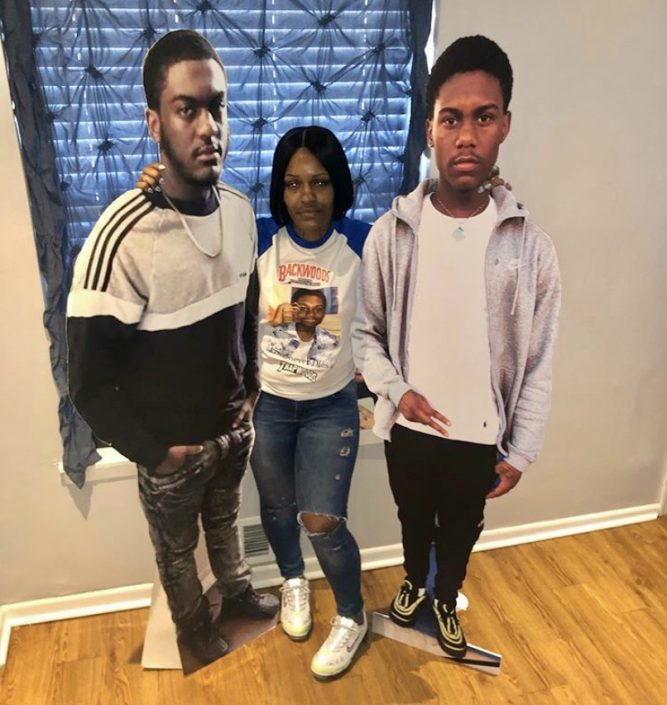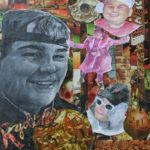
White doves. Ice sculptures. Four different repasts. More than 4,500 people.
Chimere Quattlebaum gave full measure when it came to her older son Thomas Page’s funeral in September 2018. Thomas, whose nickname was Manny, was 19 years old when he was shot and killed in Germantown, leaving Chimere with her only remaining son, Thalyl Taylor.
As she was moving through her grief, the unthinkable happened less than two years later: Thalyl was also killed.
This time, there would be no grand homegoing. Thalyl, who was 17, died March 26 of this year, in the midst of the COVID-19 outbreak, and his burial was April 6. Mourners were allowed inside the viewing in groups of 10 for five minutes.
And at the interment, only the pallbearers were permitted to stand at Thalyl’s graveside. All others, including Chimere, had to watch from a car.
“It was terrible. I wasn’t able to have a complete service for my son,” Chimere said. “I had to view my child’s body being lowered into the ground from the damn car. That was my final goodbye and I couldn’t say it.”
Funeral practices represent the last service the living can provide to those who have died. They bring people together to comfort the bereaved and help them heal, but across Philadelphia and beyond, COVID-19 has drastically changed what funerals look like, and murder victims are no exception even as the homicide rate continues to increase.
For those who’ve lost loved ones to homicide, the inability to engage in the normal mourning rituals brings an added layer of pain on top of a sudden and tragic loss.
“I want to redig my son up after this coronavirus is over and give him a proper service that he deserves,” Chimere said. “I wish I would be able to do that, but unfortunately, I can’t.”
Funerals have become very small
For funeral directors like Tiffanie Wood of Lenwood Jones Funeral Home in West Philadelphia, there’s a feeling of helplessness because they can’t provide the services families are used to.
Her funeral home is allowing only 10 guests total, and the arrangements are made via FaceTime or over the phone. They aren’t seeing families until the day before the service.
“You can’t complete your job in the same way,” she said. “You want to give it 100 percent like you’re accustomed to doing, but you can’t. You want to be able to give comfort to the families, but you can’t because of social distancing.”
Mark McCafferty of McCafferty Funeral and Cremation in Northeast Philadelphia described a service held in early April. Rather than placing the casket in the usual place at the front of a room filled with rows of chairs, it was situated a few feet from the funeral home’s open door. The family stood outside on the front steps while the officiant conducted the prayer service from the doorway.
“The family was too upset to come in here because of the virus, and they had the prayer service on the steps for the same reason,” he said. “It’s a shame, but this is what we’re dealing with.”
Grieving in isolation
Families are not only contending with disrupted funerals, they’re also unable to see their loved ones as they lie in hospital morgues.
Camille Stoner’s husband Raheem, a lead carpenter with the City of Philadelphia, was shot while driving through North Philadelphia on April 8. When Camille arrived at the hospital, she was told she couldn’t see Raheem because of the coronavirus. He died shortly after arriving.
“I feel like that’s still part of my battle that I’m going through now, where it just seems unreal to me because I wasn’t able to see my husband,” she said. “I wasn’t able to hold him. I wasn’t able to give him a goodbye kiss. I was not able to do any of those things.”
The city’s stay-at-home order, which has been extended to June 4, means those who are grieving are doing so largely in isolation.
Many members of the Stoner family are essential workers who risk exposure every day. One of Camille’s daughters has a compromised immune system, so seeing people in person, even with precautions, poses a real danger.
“It’s made it even harder because she can’t interact with her friends and part of the grieving process for children her age is through play, but I can’t risk it,” she said.
‘If you don’t deal with it, it’s going to deal with you later’
Terrez McCleary lost her daughter Tamara Johnson to homicide in 2009. She now runs Moms Bonded by Grief, a support group that meets weekly in South Philadelphia. She fears that the disruption in the grieving process as a result of the coronavirus could have lasting effects on the healing process of survivors.
She recalls a recent conversation with a mother whose son was killed at the beginning of the stay-at-home order. The family had a small viewing, but they were unable to gather and celebrate his life as they normally would.
The mom sounded upbeat on the phone and said she was fine, but when Terrez challenged her on whether she really was okay, it became clear that she was in denial.
“She said, ‘We couldn’t have a funeral for him, so I’m just expecting him to walk through the door,’” Terrez said. “It’s going to be so hard for her because if you don’t deal with it, it’s going to deal with you later. The moms that are dealing with it now, they’re going to need so much more help.”
An important part of the grieving process is having the warmth and comfort of loved ones being there physically, Terrez said. Once the funeral is over people are no longer around as much, that’s when survivors have time to sit back and think, “that’s when it gets you,” she said.
Families who are grieving during the coronavirus have jumped to that part of the process without fully having the opportunity to experience the comfort that normal mourning rituals provide.
Chimere wants to plan a celebration of her son’s life when it’s safe to gather together again. Until then, she’s added a new task to her daily routine: She puts on a mask and drives to Northwood Cemetery where her two sons share a plot.
“I come to the cemetery every day before I do anything,” she said. “I come here and sit with my kids for an hour.”
On a recent morning, she shared a video of herself driving the winding, tree-lined road through the cemetery.
“Mommy on her way, babies,” she said. “I’m coming, stinky butt butts. Mommy’s coming. I’m almost there.”
For more information on Moms Bonded by Grief, contact Terrez McCleary at [email protected].
For more resources for support, go to https://www.phillyobitproject.com/resources-for-families.










Leave a Reply